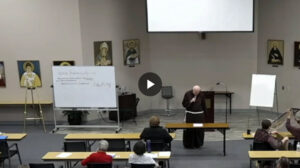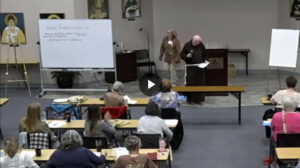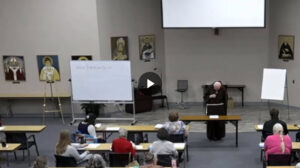BEING AN THE “EXPERT” ON THE EUCHARIST
1 Corinthians 11:17-29
In giving this instruction, I do not praise the fact that your meetings are doing
more harm than good. First of all, I hear that when you meet as a church there
are divisions among you, and to a degree I believe it; there have to be
factions among you in order that (also) those who are approved among you
may become known. When you meet in one place, then, it is not to eat the
Lord’s supper, for in eating, each one goes ahead with his own supper, and
one goes hungry while another gets drunk. Do you not have houses in which
you can eat and drink? Or do you show contempt for the church of God and
make those who have nothing feel ashamed? What can I say to you? Shall I
praise you? In this matter I do not praise you. For I received from the Lord
what I also handed on to you, that the Lord Jesus, on the night he was
handed over, took bread, and, after he had given thanks, broke it and said,
“This is my body that is for you. Do this in remembrance of me.” In the same
way also the cup, after supper, saying, “This cup is the new covenant in my
blood. Do this, as often as you drink it, in remembrance of me.” For as often
as you eat this bread and drink the cup, you proclaim the death of the Lord
until he comes. Therefore whoever eats the bread or drinks the cup of the
Lord unworthily will have to answer for the body and blood of the Lord. A
person should examine himself, and so eat the bread and drink the cup. For
anyone who eats and drinks without discerning the body, eats and drinks
judgment on himself.
Capuchin Spirit and Life, John Baptiste of Meerle, OFM Cap.
“Imitate the example of many of our blessed brethren and on awakening in the morning let your
first thought be on the approaching visit of Jesus to your soul in holy Communion. Endeavor to
excite above all lively sentiments of faith in the real presence of Jesus in the holy sacrament, and of
fervent desire to receive him in your heart. From these sentiments of faith and desire will spring up
in your heart affection and humility, confidence and love to him whom you will soon bid welcome.
Reflect seriously upon the following:
Who is he that comes to me?
Who am I to whom Jesus comes?
How does he come to me?
Why does he come to me?”
Vita Consecrata, Pope John Paul II, # 55
“In whatever activity or ministry they are involved, consecrated persons should remember that
before all else they must be expert guides in the spiritual life”
+ And: Apostolic Exhortation on the Renewal of Religious Life (Evangelica Testificatio, 1971)
“There is surely no need to remind you of the special place occupied in your community life by the
Church’s liturgy, the center of which is the Eucharistic Sacrifice, in which interior prayer is linked to
external worship. At the moment of your religious profession you were offered to God by the
Church, in close union with the Eucharistic Sacrifice. Day after day this offering of yourselves
must become a reality, concretely and continuously renewed. Communion in the Body and
Blood of Christ is the primary source of this renewal; by it may your will to love truly, and even to the
sacrifice of your lives, be unceasingly confirmed.” (47)
Letter to the Entire Order, Francis of Assisi
“Listen, my brothers: If the Blessed Virgin is so honored, as is becoming, because she carried
him in her most holy womb; if the Baptist trembled and did not dare to touch the holy head of God; if
the tomb in which he lay for some time is held in veneration, how holy, just and fitting must be he
who touches with his hands, receives in his heart and mouth, and offers to others to be received the
One Who is not about to die but Who is to conquer and be glorified, upon Whom the angels longed
to gaze. …It is a great misery and a miserable weakness that when you have Him present in this
way, you are concerned with anything else in the whole world!”
+ Henri Nouwen (The Selfless Way of Christ)
– Nouwen says that there are three principal disciplines that must be accepted in order to develop
the spiritual life, and therefore the religious life for us
– the first he calls The Discipline of the Church (the others I will get to: Discipline of the Book [has to
do with reading Scripture in order to form our lives], Discipline of the Heart [which we will hear
about later])
– he is arguing that we must become immersed in the liturgy of the Church, most of all, the
Eucharist:
“The liturgy is the celebration by the people of God of the Christ-event. It is the manifestation of
what is really taking place in human history. Christ is coming and being born in us; he lives, suffers,
dies, and is risen in us; and he sends his Spirit to us, thereby bringing us into communion with one
another.
“The first and most essential discipline by which our spiritual formation takes place is…the
discipline by which we, the people of God, create space in the midst of our human chronologies to
present the Christ-event as true for us. Thus the church is our first and foremost spiritual director.
The church not only teaches us what to reflect on, what to pay attention to, and what to speak or
think about, it also realizes in and through the liturgical discipline the Christ-event itself.” (73-74)
Secular Franciscan Constitutions(Article 14, number 2, reflecting on your Rule, number 8)
The Eucharist is the center of the life of the Church. Christ unites us to himself and to one another as
a single body in it. Therefore, the Eucharist should be the center of the life of the fraternity. The
brothers and sisters should participate in the Eucharist as frequently as possible, being mindful of the
respect and love shown by Francis, who, in the Eucharist, lived all the mysteries of the life of Christ.
Pope John Paul II’s statement that we should be “expert guides” is a challenging vocation.
What characteristics should such a “guide” possess, especially as we think of the Eucharist?


